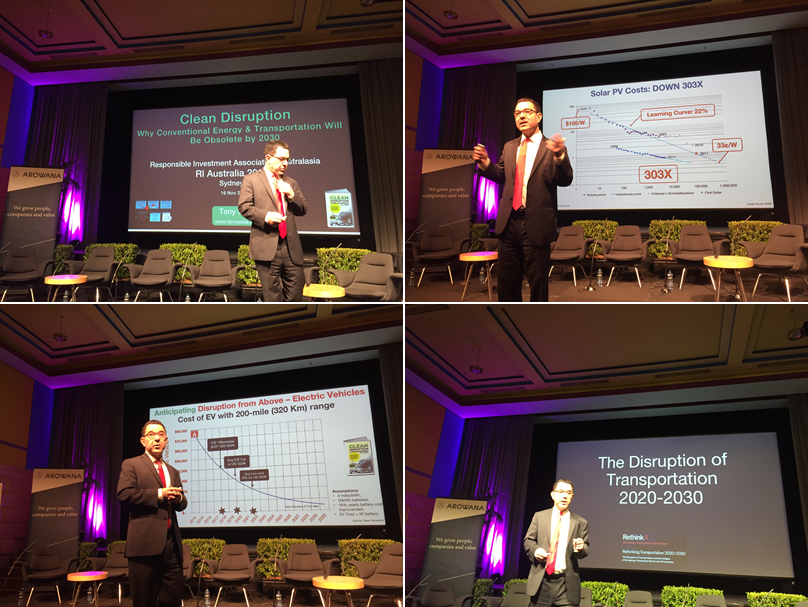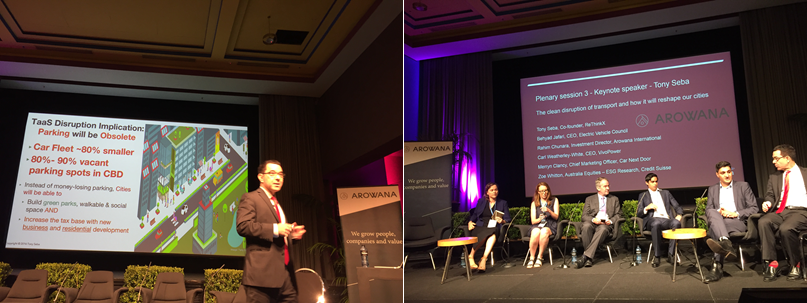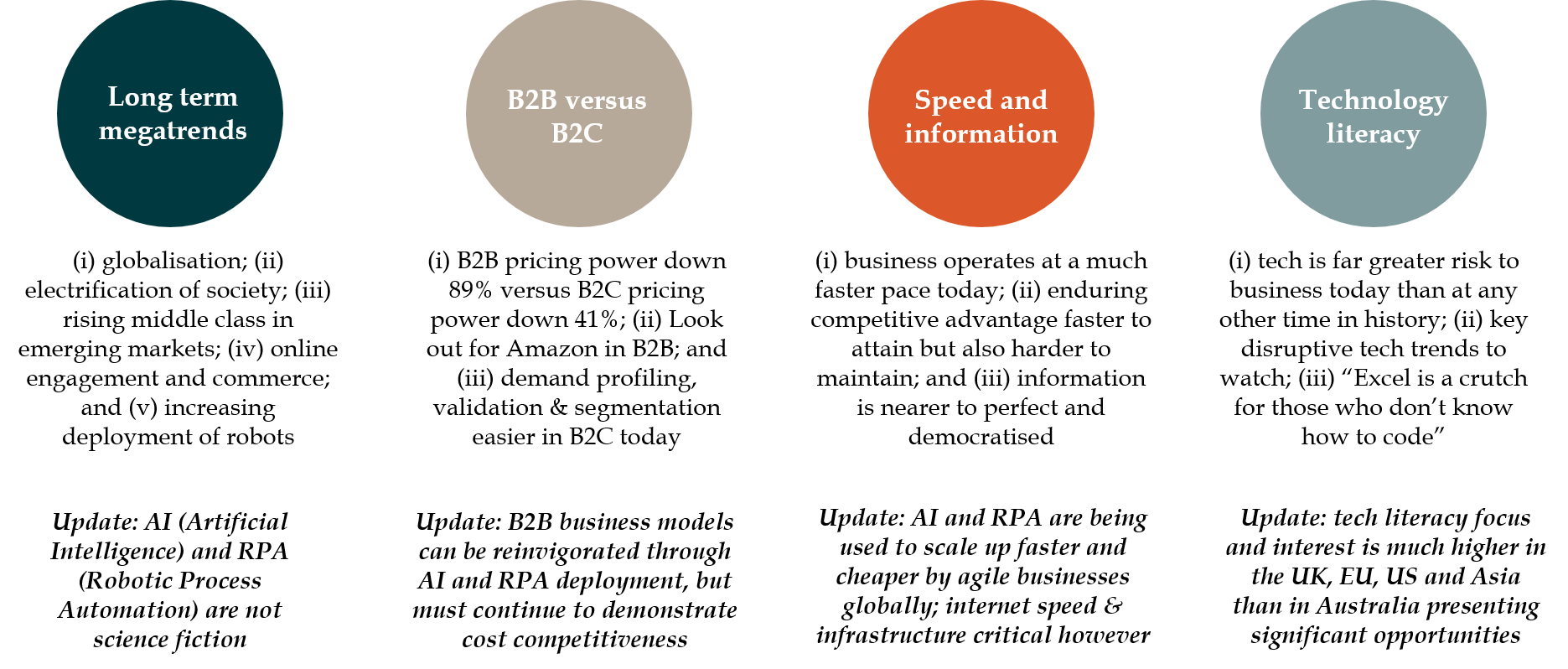As Tony Seba, author of Clean Disruption highlights, unsubsidised solar power in Australia is cheaper than coal and gas. Find out how Arowana is taking part in the clean energy sector globally.
Is Australia falling behind when it comes to clean energy? (Part 1 of 3)

TRANSCRIPT
Tony Seba: Unsubsidized solar today in Australia is cheaper than coal, is cheaper than gas, is cheaper than you know nukes, is cheaper than anything that Australia makes.
Rahim Chunara: Whilst the rest of the world has kind of really run hard at renewable energy and solar, Australia has been a much slower adopter. Having said that, it's a very active space right now and we are seeing Australia catch up quickly and there's a lot of investment in the space. Which is exciting!
Tony Seba: Australia is interesting in that residential solar, for instance, leads penetration is 20-25 percent, which is second to none in the world. Utility scale, Australia's far behind, and that's been mostly because of government obstructing solar.
Rahim Chunara: Arowana built VivoPower as a business internally, because when we scanned the market a couple of years ago to try and play the renewable energy trend, we actually found there weren't any major companies of scale that we could invest in at that time, unlike the US and the UK, where solar was absolutely thriving.
Carl Weatherley-White: Solar power is the answer for energy security in many countries, particularly in emerging markets that don't have access to transmission or other generating sources, but even in the first world, where you can site solar closer to where energy is needed
Rahim Chunara: This national energy crisis, I think―or if it is even a crisis―is certainly something that's going to be short-lived, and I think the new technologies that VivoPower and other businesses are looking to, you know, build in Australia, are really going to change that energy architecture and improve their energy security.
The Directors of Arowana International Limited (ASX: AWN) are pleased to announce that its education platform, EdventureCo, has completed a transaction to acquire all the issued share capital of DDLS Australia Pty Ltd (DDLS) from ACTE Pty Ltd.
DDLS is Australia’s largest information and communications technology training business and is a highly regarded national brand that has been operating for over 25 years.
With six campuses across every mainland state of Australia and the ACT, DDLS possesses a blue-chip client base of governments and corporates including the Department of Defence, Australian Federal Police, CSIRO, Australian Taxation Office, Telstra, ANZ Bank, Commonwealth Bank and Boeing. The business delivers vendor- and industry-certified courses for Microsoft, Cisco, Citrix, CompTIA, PMI, VMware, and many others, with 100% of its revenue being fees for service.
DDLS has a historic three-year average revenue of $37.1m, EBITDA of $2.0m and EBIT of $1.3m. Pursuant to the transaction documentation, AWN has agreed to purchase all the issued share capital in DDLS for a net purchase price of $4.7m, payable in tranches on or before 30 June 2018, funded from existing financial capacity. The transaction documentation contains customary warranties, limitations, and restraints for a transaction of this nature. The acquisition of DDLS is part of AWN’s strategy to build an education group that is run in accordance with our modus operandi and tempo. It sees the formation of a new education platform, EdventureCo, that will include Everthought Education, AWN’s existing building and construction training business, and DDLS.
The focus of the AWN and EdventureCo team is now to onboard and integrate DDLS with EdventureCo, underpinned by the introduction of an operating platform comprising common enterprise systems, processes, and protocols as appropriate, and to take advantage of the significant scope for operational engineering and optimisation.
Read below for further details of AWN’s education strategy and the DDLS acquisition that are set out in the presentation.
Arowana sponsored the 2017 Responsible Investment Australasian Association (RIAA) conference and organised this year’s keynote speaker, Tony Seba, the author of Clean Disruption of Energy and Transportation
At the 2017 Responsible Investment Australasian Association (RIAA) conference, keynote speaker, Tony Seba’s talk concentrated on how rapid technology has made energy from the sun cheaper and how fast the cost of battery storage is falling.


Tony shared his research with over 350 delegates at the Powerhouse Museum in Sydney, noting that the confluence of technology changes and cheaper alternative energy sources will see the extinction of the internal combustion engine. Many will fail to anticipate the extent of the disruption that battery storage will bring into the transport industry. Electric vehicles (EV) with 100x less parts will be 10x cheaper to maintain, and with the ability to charge an EV from solar power, transport will be much cleaner for the environment.
Tony also discussed the many advancements made in autonomous EVs. He pointed out how individual car ownership will soon be made redundant, given how autonomous EVs combined with an on-demand service such as Uber, will ultimately make private or individual car ownership superfluous, and an unnecessary expense. Car fleets will be up to 80% smaller, drastically reducing the need for parking spots. This will be an opportunity for urban planners to redesign cities and create more liveable and affordable residential spaces replete with green parks and additional zones for walking and social interaction.
Tony was later joined by a panel that included Arowana Investment Director, Rahim Chunara; VivoPower CEO, Carl Weatherley-White; EV Council CEO, Behyad Jafari; Credit Suisse ESG Analyst, Zoe Whitton; and Car Next Door CMO, Merryn Clancy.
The panel discussion was robust and went well into the morning break. The discussion made it apparent that policies and infrastructure need to be put in place to help drive conditions for acceptance and adoption of these impending changes. In response to the questions regarding when participants would be turning up to a RI Conference in an autonomous EV, most thought it would be around 2027. Tony, however, thought it could be sooner―perhaps by 2023. Regarding queries about solar energy, Australia already has the highest penetration rate in the world for residential solar and could lead the world in the adoption of EVs as well as autonomous EVs.
Arowana’s global observations point towards autonomous EVs making commercial sense as they are far more economic, with less energy and labour costs. Autonomous vehicles are already a reality in business―as Arowana’s advisory board member and robotics and automation expert, Prof. Hugh Durrant-Whyte, has proven when he helped implement the automation at Patricks Stevedores and the autonomous mining trucks for Rio Tinto.
All we need to do now is to convert them into autonomous electric vehicles.

I have led turnarounds and driven accelerated growth in multiple companies, and in sectors ranging from software to education, traffic management, media, and solar energy. For me, successfully executing a turnaround is easier than managing accelerated growth. Here's why:
In many circumstances, the tools for a turnaround are the same tools that should be used for accelerated growth, especially when a growing pains inflection point (where systems, people and/or processes are breaking) is being experienced. For example, fast-growing companies tend to be the most inefficient when it comes to cost management, so a lean management program that would be used in a turnaround phase would be appropriate for that fast-growing company.
Companies will oscillate through periods of turnaround and episodes of fast growth. In fact, many turnaround situations are born from the failure to manage accelerated growth properly, especially when this growth has been debt-funded. Conversely the momentum from a well-executed turnaround can lead to an episode of accelerated growth and success. Importantly, a turnaround phase can help you identify and build up a leadership team with the right ethos, stamina, and discipline to successfully deliver on an accelerated growth phase.
The collapse of Careers Australia left over 15,000 students without an institution through which they could finish their studies and left over 1,000 staff without jobs. Fortunately for some of those students and staff, Arowana’s wholly-owned subsidiary, Everthought Education, was able to offer a new home.
A joint team of investment and operations specialists from Arowana and education operators from Everthought moved swiftly evaluate the available opportunity, engage in negotiations with the administrator of Careers Australia, and secure regulatory clearance from key State and Federal stakeholders for their proposed solution.
Following an intense three-week period, Everthought Education acquired the carpentry, painting, and decorating operations of Careers Australia, offered students in those courses places at Everthought, with recognition of their existing studies, and offered new employment options to select ex-Careers Australia staff.
A key factor in the successful outcome of this transaction was Arowana’s unique willingness to “fight in the trenches” alongside its business operators. This enabled the team to move with pace and precision, against the backdrop of pressure from Careers Australia’s secured creditors and regulatory authorities.
The Sydney Morning Herald comments on this in their recent article, “Lifeline for 2,800 Careers Australia students but 12,000 remain in limbo”. Click below to read the full article.
Social scientists and psychologists are increasingly acknowledging that EQ (emotional intelligence) is just as, if not more important, than IQ (intelligence quotient, a measure of cognitive intelligence) as far as success in business and life is concerned. As a result, when I mention EQ and IQ, people generally know what I am talking about.
However, when I use the term AQ, almost no one understands the reference. AQ stands for adversity quotient, or simply put, resilience. And I believe it is more important than EQ and IQ, especially in business.
In my experience of having started five different businesses―and going on to scale, grow and sell them―I've come to realize that resilience is the key common denominator in terms of growth and successful outcomes.
It's been said that we're living in the best possible time to be an entrepreneur. When talking with fellow entrepreneurs, however, we are unanimous in agreement that collective enterprise resilience―AQ―is the key determinant of success and winning in the business realm. This is not to say that EQ and IQ are unimportant; I consider them as necessary but insufficient requirements. Without AQ, the success of your team will be finite. So, how do you ensure your organization achieves the highest possible level of AQ?
Here are some practical tips:
Ultimately, winners are not those who never fail, but those who never quit. It's crucial to understand that a winning team will collectively exhibit high AQ, above all else.